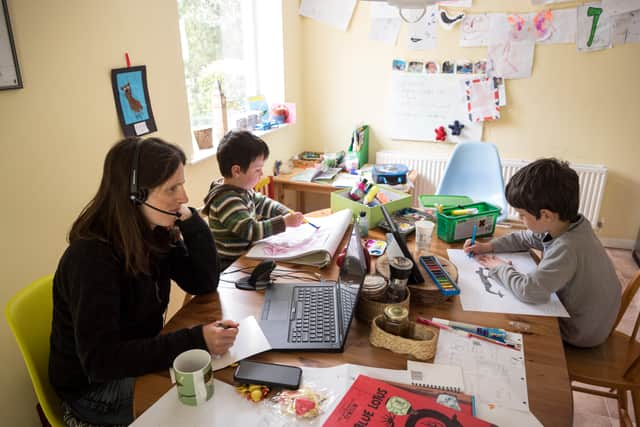Why working from home doesn’t make you a ‘workshy refusenik’
This article contains affiliate links. We may earn a small commission on items purchased through this article, but that does not affect our editorial judgement.


There’s a lot of shade being cast on those who’ve decided they would quite like to stay working at home.
“Idlers”, “snowflakes” or even “TW*TS” (those dragging themselves into the office on Tuesday, Wednesday and Thursdays) are just some of the abusive terms being hurled their way by certain newspaper columnists.
Advertisement
Hide AdAdvertisement
Hide AdAccording to McKinsey, less than one in 10 of workers globally want a full-time return to the workplace. Is this revealing a latent laziness that’s always been there, where employees are living their best life, able to roll straight out of bed and work in their pyjamas all day? Or has something more fundamental changed about the way we are going to work in the future.
As a career coach, working with both individuals and organisations during the pandemic, I’ve had an intimate insight into how the pandemic has changed the way we work and feel about work and I don’t recognise the “workshy refuseniks” label that’s being bandied about.


Firstly, we are still in a pandemic with many countries going back into lockdown. You can’t spend months telling people of the dangers of social contact and then expect them to fully embrace the germ-laden environments of the office and a packed commute if they don’t have to. From this standpoint, reducing risks makes practical sense.
Secondly, remote and hybrid working is hardly a new innovation. Many businesses were already operating in this way. Remote working technologies, freelance and gig workers meant that this was already a projected trend.
Advertisement
Hide AdAdvertisement
Hide AdThe difference, post-pandemic, is that organisations and managers traditionally resistant to home working, were forced to rely on this to keep their businesses running. What was frankly amazing was just how quickly people adjusted and how successful it was. Many people found it revelatory about how much more productive they could be without the distractions of the office while companies discovered new and better ways to get things done. The evidence of this great home-working experiment has made many of the old arguments for office presenteeism, simply redundant.
People are working harder than ever
Has it made staff lazier? Far from staff lounging around at home, there’s evidence that they are working harder than ever. A poll conducted by Hays found that more than half of UK employees worked longer hours than before the pandemic with 25% reporting that they work an extra 10 hours a week and 41% working between and extra 5 and 10 hours per week.
So while home working offers greater flexibility to pick the kids up from school or put the washing on, employees are more than making the time up. Even without the frankly sinister surveillance technology that some employers are introducing, employees who perform poorly are likely to be found out.
Previously if you looked busy while you were in the office you might be left alone, but with remote working your manager is going to focus much more on outputs and what you’ve actually achieved. Indeed, one of the bigger challenges is employees working too hard given the blurring of work/life boundaries with no natural “leaving time”. Longer hours doesn’t always mean greater productivity and employee burn-out is a very live workplace issue.
The downsides of WFH
Advertisement
Hide AdAdvertisement
Hide AdHowever, that’s not to say there aren’t downsides to working from home full-time:
- Not everyone has an ideal space to work.
- It can be lonely and isolating.
- You miss the office camaraderie, the sense of belonging, the social interaction and the energy and creativity sparked by people working closely together in real time on challenges.
- New and younger staff don’t have the same opportunities to absorb the company culture and learn from observing others.
- There are also real risks to your career progression if you’re not visible to those you want to impress as it’s much harder to network outside of your immediate work circle and build a wider reputation.
Flexibility is the new normal
Everyone is still in the process of figuring out what is going to be the best way to work together in the future. Now that employees have enjoyed the greater convenience of home working, the reduced costs, avoiding the stress of the commute and office politics, who can blame them for being reticent about a wholesale return?
A recent EY Work Reimagined Survey found that 54% would consider leaving their job if that flexibility is not forthcoming. In a tight recruitment market with skills shortages, organisations who want to keep hold of their staff would be foolish to ignore this.
As the pandemic recedes, there may be a partial return to the office as an agreeable compromise that reaps the benefits of both home and office working.
Advertisement
Hide AdAdvertisement
Hide AdBut given the success of the great home working experiment, it looks like the old five day a week office commute may be consigned to pre-pandemic ancient history - and good riddance.
Corinne Mills is an expert career coach and organisational career development consultant with Personal Career Management and has helped thousands of people to love Monday mornings and be successful in their career. She is also a best-selling author on Career Coaching and CVs.
A message from the editor:
Thank you for reading. NationalWorld is a new national news brand, produced by a team of journalists, editors, video producers and designers who live and work across the UK. Find out more about who’s who in the team, and our editorial values. We want to start a community among our readers, so please follow us on Facebook, Twitter and Instagram, and keep the conversation going. You can also sign up to our email newsletters and get a curated selection of our best reads to your inbox every day.
Comment Guidelines
National World encourages reader discussion on our stories. User feedback, insights and back-and-forth exchanges add a rich layer of context to reporting. Please review our Community Guidelines before commenting.
